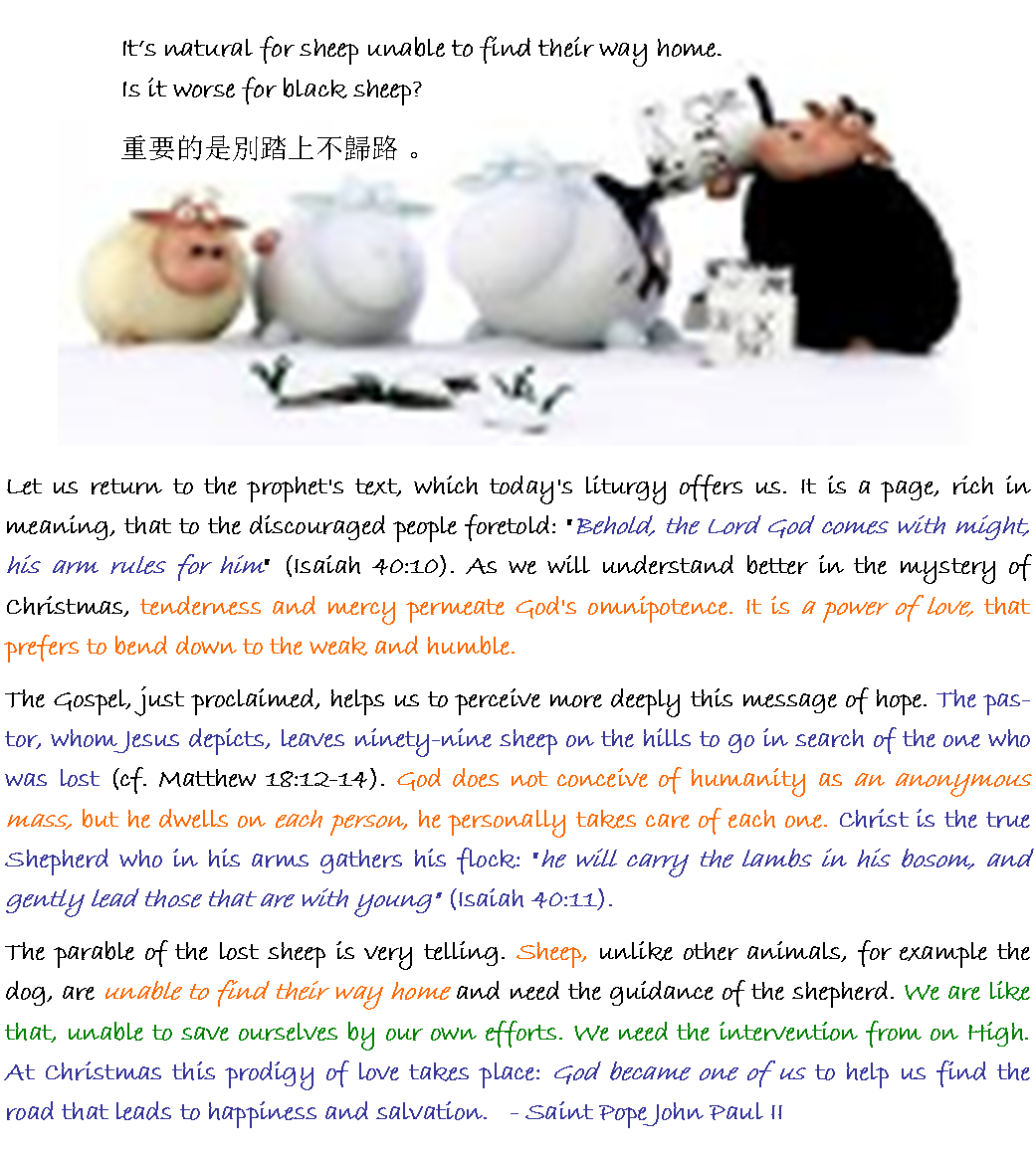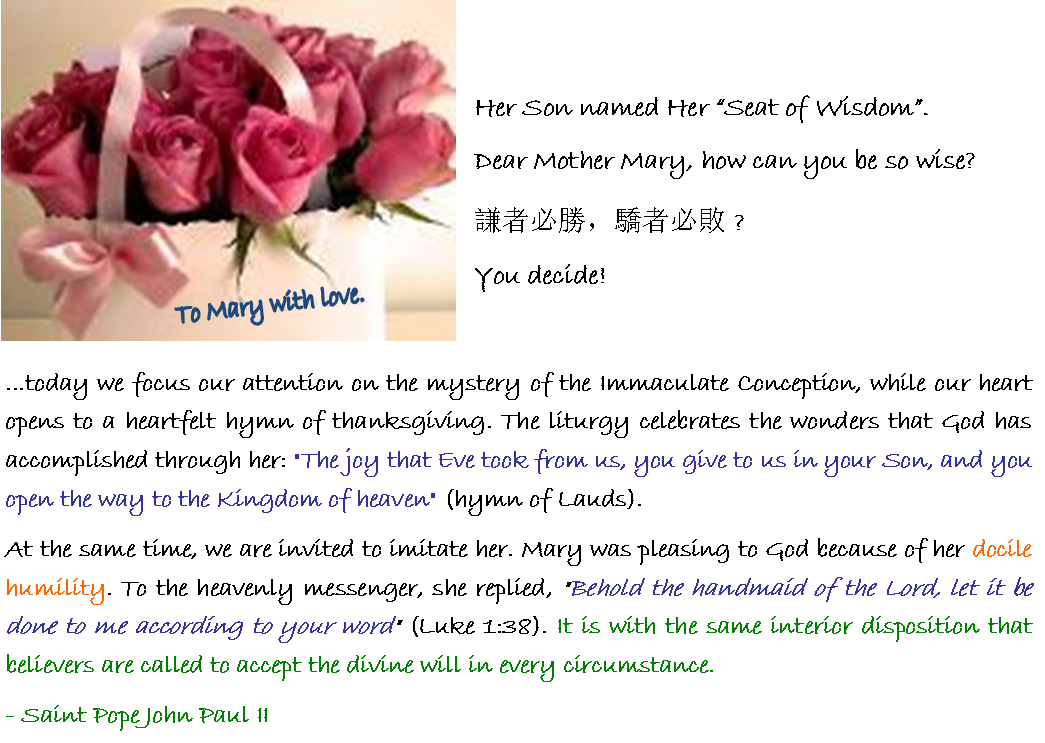|
297 |
|
3. Dear brothers and sisters, in three days we will contemplate in the Immaculate Conception the first and most complete fulfilment of this promise. Mary, "full of grace", is the realization of all that God wants to accomplish in every person. The Mother of the Redeemer was preserved from sin and filled with divine grace. Her spiritual beauty invites us to have confidence and hope; the Blessed Virgin, all fair and all holy, encourages us to prepare the ways of the Lord and make straight his paths, in order one day to contemplate with her the salvation of God.
After reciting the Angelus and giving his Blessing, the Holy Father greeted various pilgrim groups from Poland, Spain and Italy. |
|
ADVENT MASS FOR THE FACULTY AND STUDENTS HOMILY OF JOHN PAUL II Tuesday, 10 December 2002
Dear Brothers and Sisters,
1. "Comfort, comfort my people, says your God" (Isaiah 40:1).
With this invitation the section of the Book of Isaiah known as the "Book of Consolation" begins. In it the Second Isaiah brings to the people in exile the joyful proclamation of liberation. The time of punishment is over; Israel can look forward confidently to the future: at long last it awaits the return to its native soil.
This joyful proclamation also applies to us. Basically, we are all travellers on the road of life. Life is a long road on which each human being, a pilgrim of the Absolute, struggles to find a safe and stable dwelling place. The passing of time confirms to the human person that this dwelling place is not to be found here on earth. Our true and definitive home is heaven. The author of the Letter to the Hebrews will say: "For here we have no lasting city, but we seek the city which is to come" (Hebrews 13:14).
In this perspective the word of the prophet is consoling. He confirms for us that God walks with us: "Comfort, comfort my people.... And the glory of the Lord shall be revealed, and all flesh shall see it together" (Isaiah 40:1, 5). In the night of Bethlehem, the Word of God became our travelling companion. He took our flesh and accepted to share even to death our condition. So then in faith we can accept in all its force his hopeful wish: "Comfort, comfort my people!". 2. With this sense of intimate joy, I greet you, distinguished rectors and professors, and you, dear students of the Roman universities. I express my gratitude to each one of you for not wanting to miss our traditional meeting in the Advent season.
I especially greet the [Italian] Vice Minister for Universities, and the delegation of Italian university rectors present at this celebration, and the representatives of the historic European universities. I thank the Rector of the University of "Tor Vergata" and the student of "La Sapienza" for their kind expression of your sentiments. I feel completely at home with you.
The mystery of Christmas brings a message of truth about God's realization of his saving plan.
Yes, "the glory of the Lord shall be revealed, and all flesh shall see it together" (Isaiah 40:5). We can all contemplate it and be enlightened by it. Before this glory, the prophet continues, "all flesh is grass, and all its beauty is like the flower of the field" (Isaiah 40:7).
The glory of God and the glory of humanity: can human glory ever compare with divine glory? Can any power on earth ever compare with the Lord? The great persons of the earth like Nebuchadnezzar, Darius, Cyrus are "like grass", like the flower that "fades, when the breath of the Lord blows upon it" (Isaiah 40:7). Nothing resists God. With his omnipotence, he alone rules the universe and guides the fortunes of persons and history.
Let us reflect on the century that has just ended and on our times: how fragile have the powers proven to be that claimed to impose their supremacy! Even when science, technology and culture claim omnipotence, basically they prove to be like grass that soon shrivels, like a flower that withers and dies.
4. May these words of the prophet that we have heard resound in every heart. They do not mortify human freedom; on the contrary, they enrich it by guiding it on paths of genuine human progress. In this light, the pastoral care of the university, which the Church promotes with great care in centres of study and scientific research, can be of great help.
I remember my own experience of the university. From daily contact with students and professors I learned that it is essential to provide an integral formation that will prepare young people for life: an education that educates them to assume their role in the family and in society with responsibility and with not just a professional, but also a human and spiritual competence. From those years that left their mark on my life, I drew useful lessons which I sought to put forward in my essay on Christian ethics, "Love and Responsibility", and in my play about marriage, "The Jeweller's Shop". |
|
5. Let us return to the prophet's text, which today's liturgy offers us. It is a page, rich in meaning, that to the discouraged people foretold: "Behold, the Lord God comes with might, his arm rules for him" (Isaiah 40:10). As we will understand better in the mystery of Christmas, tenderness and mercy permeate God's omnipotence. It is a power of love, that prefers to bend down to the weak and humble.
The Gospel, just proclaimed, helps us to perceive more deeply this message of hope. The pastor, whom Jesus depicts, leaves ninety-nine sheep on the hills to go in search of the one who was lost (cf. Matthew 18:12-14). God does not conceive of humanity as an anonymous mass, but he dwells on each person, he personally takes care of each one. Christ is the true Shepherd who in his arms gathers his flock: "he will carry the lambs in his bosom, and gently lead those that are with young" (Isaiah 40:11).
6. The parable of the lost sheep is very telling. Sheep, unlike other animals, for example the dog, are unable to find their way home and need the guidance of the shepherd. We are like that, unable to save ourselves by our own efforts. We need the intervention from on High. At Christmas this prodigy of love takes place: God became one of us to help us find the road that leads to happiness and salvation.
Distinguished rectors and professors, dear students, let us open our hearts to the Child who will be born for us in Bethlehem! Let us prepare to receive his light to guide our steps and his love that gives vigour to our lives. May the Blessed Virgin, Seat of Wisdom, accompany us in our attentive expectation.
With these sentiments, I express my cordial best wishes to you and to your families. May the celebration of Christmas be peaceful and holy! To all of you a Blessed Advent and Merry Christmas! Amen.
SOLEMNITY OF THE IMMACULATE CONCEPTION JOHN PAUL II ANGELUS Second Sunday of Advent
Brothers and Sisters,
1. Every day when we pray the Angelus, we repeat three times: "And the Word was made flesh". During the season of Advent, these evangelical words assume a more intense meaning because the liturgy makes us relive the atmosphere of the expectation of the Incarnation of the Word. For this reason, Advent is the ideal season for the Solemnity of Mary Immaculate. The humble young woman of Nazareth, who with her "yes' to the angel changed the course of history, was preserved from every stain of sin from the moment of her conception. In fact, Mary was the first one to benefit by the salvation brought about by Christ, chosen from all eternity to be his Mother. |
|
2. For this reason, today we focus our attention on the mystery of the Immaculate Conception, while our heart opens to a heartfelt hymn of thanksgiving. The liturgy celebrates the wonders that God has accomplished through her: "The joy that Eve took from us, you give to us in your Son, and you open the way to the Kingdom of heaven" (hymn of Lauds).
At the same time, we are invited to imitate her. Mary was pleasing to God because of her docile humility. To the heavenly messenger, she replied, "Behold the handmaid of the Lord, let it be done to me according to your word" (Luke 1:38). It is with the same interior disposition that believers are called to accept the divine will in every circumstance.
3. "We follow you, Immaculate Virgin, drawn by your holiness" (antiphon of Lauds). So today, we turn to Mary, conscious of our weakness, but sure of her constant help as our Mother. This afternoon I will happily renew the traditional homage to her in the Piazza di Spagna, making myself the interpreter of the devotion of the diocese of Rome and of the whole Church. I invite you, dear brothers and sisters, to join me in this act of Marian faith.
Let us now ask the Immaculate Virgin to help all Christians to be authentic disciples of Christ, so that in them faith may be ever more pure, hope ever more firm, and charity more generous.
----------------------------------------------------------------
After the Angelus:
I want to invite you to accompany with your prayer the political leaders who will meet in Copenhagen, Denmark on the coming 12 and 13 December to conclude important negotiations that concern the admission of new nations to the European Union. This continent can then be enriched with the contribution of the cultural and religious traditions of nations who down through the centuries have left us a prized common patrimony of civilization. May God show all Europeans how to become united so that they may continue to offer confidence and hope to other peoples.
To the Spanish-speaking
With affection I greet the Spanish-speaking pilgrims, and in a special way the members of the "Work of the Church". The feast of the Immaculate Conception is deeply felt by so many towns and cities of Spain and of South America.
On this day I wish to express my closeness to the dear Galician people, who are passing through a time of uncertainty on account of the serious catastrophe that has damaged their coasts and endangers the self-sacrificing work of fishermen and the progress of the community. While I encourage all to work intensely to solve this difficult problem, I also ask God that helpful solutions may soon be found so that Galicia may regard its future with renewed hope.
To the Italians
I greet the Italian pilgrims and in particular the members of the Pontifical Academy of Mary Immaculate led by Cardinal Andrzej Maria Deskur. Beloved, on this solemn day, I offer my cordial best wishes to you for your initiatives.
May the Immaculate Virgin watch over all.
4 January 2015 |


